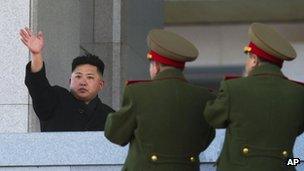North Korea's Kim Jong-un named marshal
-
Published

North Korean leader Kim Jong-un has been given the title of marshal, state media announced.
The title - the top functioning military rank - was held by both his late father and grandfather, North Korean founding father Kim Il Sung.
In the latest move in a high-level military reshuffle, Hyon Yong-chol was named as army chief.
The previously little-known general came to sudden prominence on Monday after his predecessor was removed.
Ri Yong-ho's demotion was attributed to illness, but has been widely interpreted by analysts as a purge aimed at stamping the authority of the new leader on North Korea's powerful army.
Kim Jong-il died in December 2011 and was posthumously promoted to generalissimo - formally the country's most senior rank - in February, when the country marked what would have been his 70th birthday.
Meteoric
"A decision was made to award the title of Marshal of the DPRK [North Korea] to Kim Jong-un, supreme commander of the Korean People's Army,'' the KCNA statement said.
The decision was jointly made by the Central Committee and the Central Military Commission of the Workers' Party of Korea, the National Defence Commission of the DPRK (North Korea) and the Presidium of the Supreme People's Assembly of the DPRK, the statement said.
At a military meeting in Pyongyang following the announcement, Mr Hyon was introduced as "chief of the general staff of the Korean People's Army".
His assumption of that title has not been formally announced but it had been widely anticipated by observers after he took the position of vice-marshal from Mr Ri.
Nonetheless, the promotion remains a meteoric rise for the previously little known Mr Hyon, who was made a general in 2010, analysts say.
It appears to signal a dramatic attempt by Kim Jong-un to assert control over an army whose influence burgeoned under the "military first" policy adopted by his father.
The army not only plays a leading role in the political life of the country but also in economic decision-making.
Observers have also highlighted a "generational shake-up" taking place in the military, with older leaders being replaced by figures several years younger.
Mr Hyon's age is not known, but he is thought to be about a decade younger than Ri Yong-ho, 69.
Power 'reconstitution'
Ri Yong-ho was extremely powerful: as well as army chief he was vice-chairman of the powerful Central Military Commission and held top posts in the ruling Workers' Party.
His removal took many North Korea observers by surprise, with widespread scepticism at the official explanation.
He had been seen as a key figure in the recent transition of power to the young leader.
''What we are seeing is a reconstitution of the North Korea leadership from the old guard who were loyal to Kim's father to a new guard,'' Jasper Kim of the Asia Pacific Global Research Group told the BBC.
In a rare move, state media released a statement on Wednesday morning saying an important announcement was due shortly before the news of Kim Jong-un's appointment.
This, analysts say, could be another signal that the young leader, believed to be in his late 20s, is painting a slightly different image for himself from that of his father.
Kim Jong-un is a ''young person raised in the era of the internet'' and was educated abroad in Switzerland, Jasper Kim pointed out.
He has recently been photographed with a ''mystery woman'', leading to speculation over her identity. Pyongyang has not released any details about her, and it is not known if Mr Kim is married.
Mr Kim and those around him are being keenly watched for the direction in which they will take the communist state.
North Korea - which remains technically at war with South Korea - conducted nuclear tests in 2006 and 2009, since when international talks on ending its nuclear ambitions have been stalled.
It also launched a rocket in April, saying it wanted to put a satellite into orbit. The US and North Korea's neighbours said the launch - which failed - was a long-range missile test that violated UN resolutions.